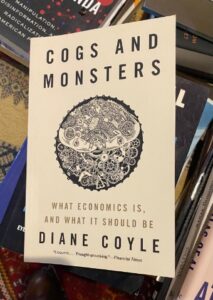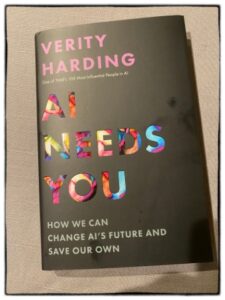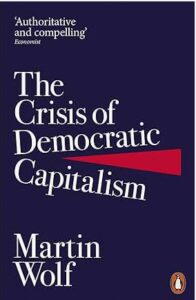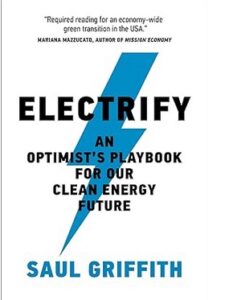Gardener’s world

Quote of the Day
”A clothes rack in search of a war zone.”
- Gavin Jacobson on the faux intellectual Bernard-Henri Lévy
Musical alternative to the morning’s radio news
Samuel Barber | Adagio for Strings, Op.11 | Vienna Philharmonic | (Summer Night Concert 2019)
Nice piece now that Spring is — allegedly – here.
Long Read of the Day
How the “Frontier” Became the Slogan of Uncontrolled AI
Terrific essay by Bruce Schneier about the pernicious power of metaphors.
Artificial intelligence (AI) has been billed as the next frontier of humanity: the newly available expanse whose exploration will drive the next era of growth, wealth, and human flourishing. It’s a scary metaphor. Throughout American history, the drive for expansion and the very concept of terrain up for grabs—land grabs, gold rushes, new frontiers—have provided a permission structure for imperialism and exploitation. This could easily hold true for AI.
This isn’t the first time the concept of a frontier has been used as a metaphor for AI, or technology in general. As early as 2018, the powerful foundation models powering cutting-edge applications like chatbots have been called “frontier AI.” In previous decades, the internet itself was considered an electronic frontier. Early cyberspace pioneer John Perry Barlow wrote “Unlike previous frontiers, this one has no end.” When he and others founded the internet’s most important civil liberties organization, they called it the Electronic Frontier Foundation.
America’s experience with frontiers is fraught, to say the least. Expansion into the Western frontier and beyond has been a driving force in our country’s history and identity—and has led to some of the darkest chapters of our past. The tireless drive to conquer the frontier has directly motivated some of this nation’s most extreme episodes of racism, imperialism, violence, and exploitation.
That history has something to teach us about the material consequences we can expect from the promotion of AI today…
This is a long essay but worth your time because it looks at what’s going on through an insightful lens. The narrative about ‘unstoppable’ all-conquering ‘AI’ is actually the latest version of a colonial imperative — rather as “Go West, Young Man” was one for the 1890s in America.
Books, etc.
Analog nostalgia?
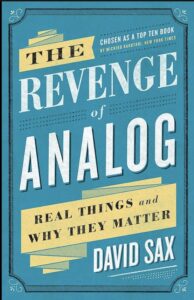
A funny thing happened on the way to digital utopia: people are deciding that they rather like the non-digital alternatives. My kids, though obsessed with music, are buying vinyl LPs and digging out old turntables from the family attic. And their kids are discovering the special qualities of 35mm celluloid film. In his book David Sax examines the people and companies at the forefront of analog’s new growth and argues for the enduring value of real things, even while embracing constant change.
I kept my turntable and my LPs, but they’re in storage. And I still have my film cameras, but haven’t used them much in the last few years. I bought this book a few weeks ago and the big test is whether it’ll change my behaviour.
My commonplace booklet
A laugh a minute
Nice sharp piece by Jonty Bloom on the activities of what is loosely called the UK’s ‘government’. Apparently he’s been reading the Daily Telegraph and its Sunday stablemate.
At the moment the government and its commentariat supporters are desperately trying to whip up a storm of indignation about those who are too ill to work, with the obvious solution that their benefits should be cut further. Because the way to get the ill back to work is to increase their levels of malnutrition.
Nowhere in the articles I read was there any acknowledgement that if you run down the NHS so that millions are waiting years for treatment, it shows up in the jobless figures. Nor, that if you don’t give people enough benefits to feed themselves or their children then they will develop long term health problems. Nor that if you force down wages and protections at work you end up with an underclass of people with severe anxiety and depression and other mental problems.
No, apparently they are all just lazy shirkers, enabled by woke doctors who sign them off work at the drop of a hat.
Oh, and the obvious solution is a “real” Tory government, unlike the last 14 years which have apparently been nothing but a left wing farce with policies that Labour would support.
This Blog is also available as an email three days a week. If you think that might suit you better, why not subscribe? One email on Mondays, Wednesdays and Fridays delivered to your inbox at 6am UK time. It’s free, and you can always unsubscribe if you conclude your inbox is full enough already!


